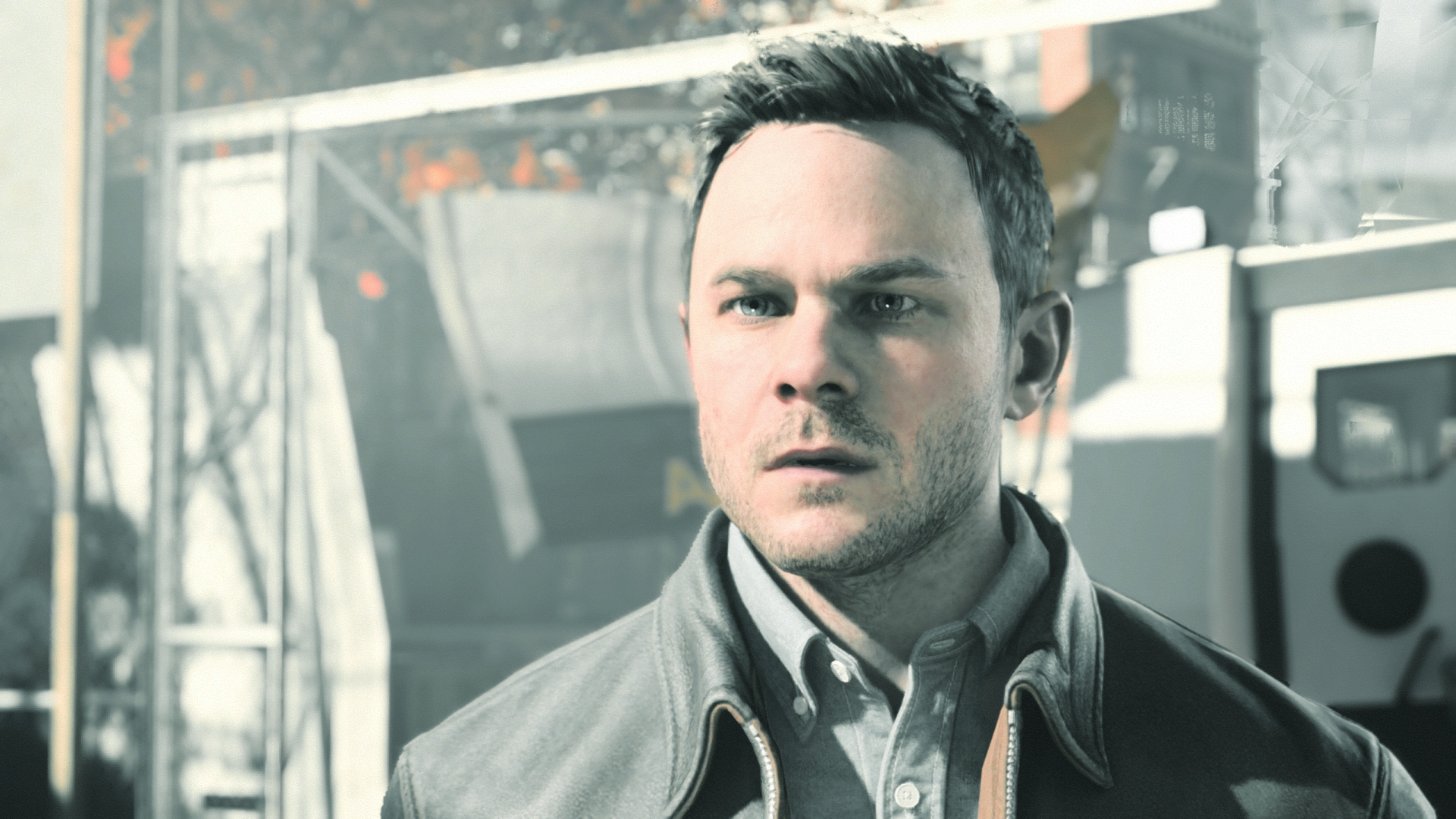GamesRadar+ Verdict
Pros
- +
The creative
- +
speedy combat is great fun
- +
The story aspires to an interesting
- +
layered narrative
Cons
- -
The combat never evolves to a truly satisfying level
- -
Disjointed structure leads to big pacing issues
- -
The TV show is rather underwhelming
Why you can trust GamesRadar+
You probably know the story of Icarus. That Greek guy who made a set of wings, stuck them together with wax, but then flew too close to the sun, melted said wax, and plummeted to his doom. He’s long been the go-to analogy for over-ambitious projects that fail due to unchecked determination. But what if, instead of flying too high and getting royally messed up by the day-star, Icarus had drawn up a great design for his wings, and then decided – possibly under the advice of committee – to add an armchair, a foot-rest, a sandwich toaster and a small patio? Imagine if, with all of these undoubtedly fantastic, high-end features attached, he leapt off the cliff expecting the most comfortable and well-equipped flight in the history of flight, and instead tumbled immediately into the sea under the unnecessary weight of his unwieldy additions.
Yeah, Quantum Break is a bit like that.
Announced as the figurehead for Microsoft’s original Xbox One strategy of blending games and TV together into a delicious, frothy, media milkshake – until MS realised no-one liked how that tasted and cancelled the whole plan – Quantum Break is one-part kinetic, shooting spectacle, one-part static viewing experience, and one part wondering why no-one saw that things weren’t hanging together properly. It’s not that any given element is bad – the TV show segments aren’t great, but you’ve probably seen worse – more that each of Quantum Break’s various constituent parts fail to convincingly connect with the others, leading to a piecemeal, Frankenstein experience unable to use any of its promising but discordant assets to their full potential.
Starting with the game’s main positive, the core shooting experience is certainly capable of delivering a great time. Combining satisfyingly tactile gunplay with an array of quick and immediate time-bending powers – most of which, pleasingly, are furnished early on, expanded only by incremental upgrades across the course of the campaign – at its best, Quantum Break’s combat is a fast, rangey, excitingly free-form experience.
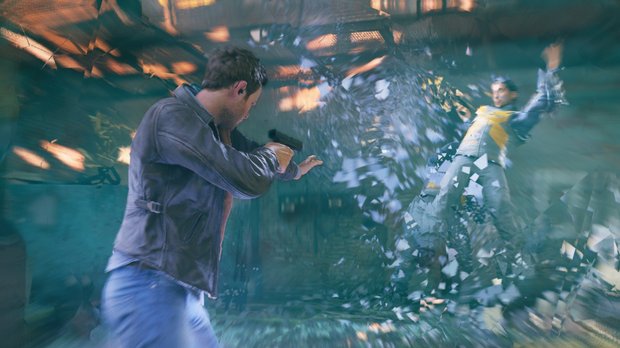
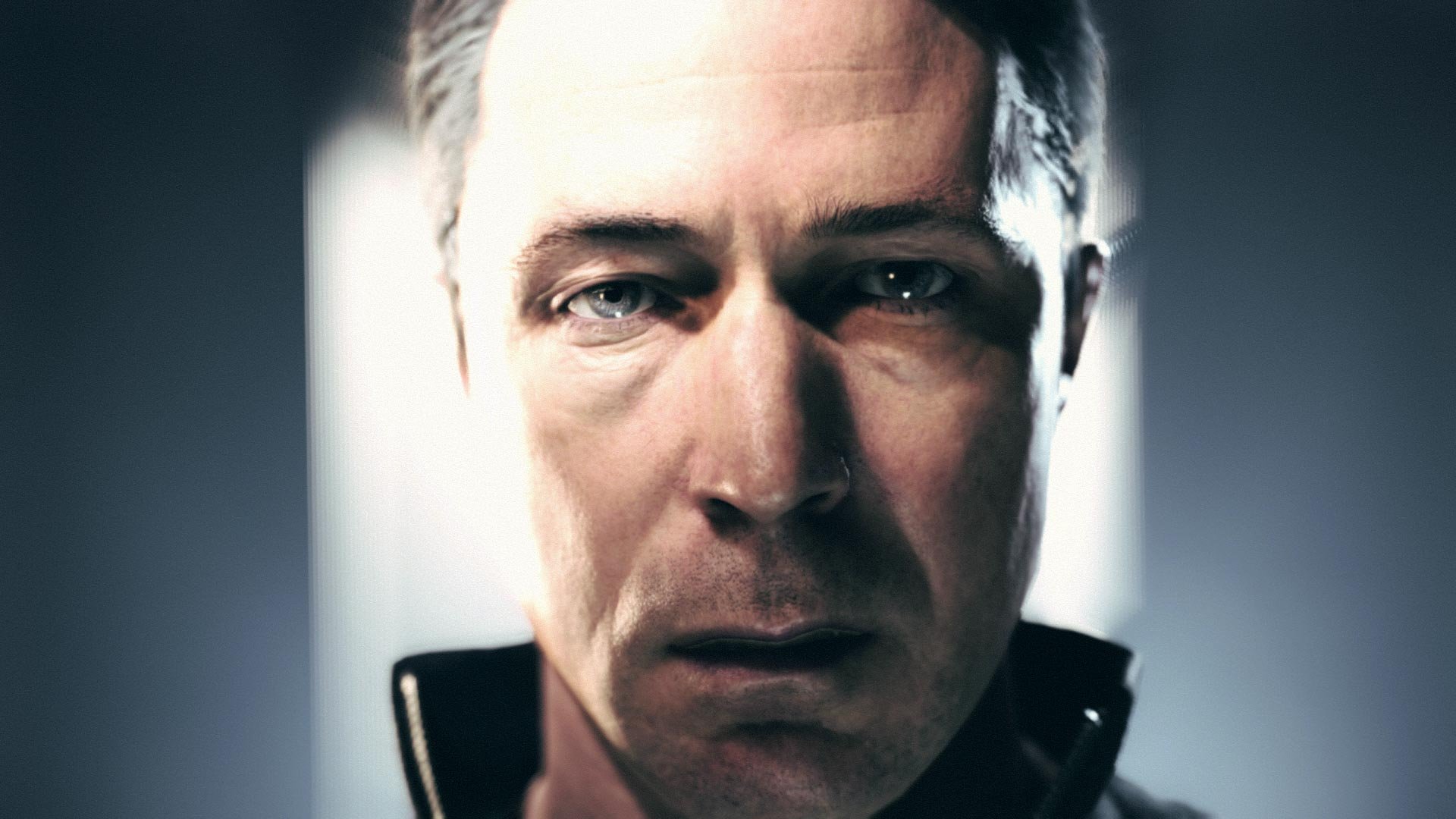
Before each episode of the TV show, you'll play a quick 'Junction' section. These non-violent, dialogue-driven sequences cast you as chief bad guy Paul Serene, and allow you to make decisions that tweak the way the story will play out. You'll influence things like which employees he trusts, and whether he uses PR or oppression to clean up a corporate mess. Though don't expect any Walking Dead-style agonising. Paul's clairvoyant time powers let him see exactly how things will play out before choosing, making it all a bit of a non-event.
Over the course of any fight (except in odd spots where certain powers are disabled) you’ll likely find yourself using every trick at your disposal. You’ll teleport in and out of cover, and warp-sprint between hails of gunfire to deliver knock-out melee blows. You’ll control space by trapping enemies in pockets of stasis and loading them up with frozen bullets, your salvo ready to hit simultaneously once it regains its momentum. As you dash about the place, you’ll even create impromptu safe-zones on the fly, by deploying bubble-shields of slowed time in which to regenerate health, relatively safe from incoming fire. When in full flow, it’s a lightning-quick, improvisational carnival of unfolding options and self-made advantages, allowing you to mould and reshape the flow and pace of battle on a whim. It’s exhilarating, and very, very empowering, indeed.
But that, actually, is a bit of a problem. If anything, it’s too empowering. Quantum Break quickly makes you such a gleeful master of your surroundings that, even when facing off against enemies with watered-down variants of your abilities, you’ll rarely feel challenged. Taking apart each battlefield is always fun, but with enemy AI hardly oppressive and the game’s more interesting heavy units rationed off for far too long (they rarely integrate into larger fights, usually appearing as imposing but easily dealt-with gimmicks) you’ll all too frequently sprint across the line between ‘powerful’ and ‘godlike’. Spam out the time powers freely enough, and genuine challenge becomes a rarity, for all of the frenetic pace and visual sparkle at play. What should be a meaty and engaging combat model often ends up feeling a little lightweight.
It’s ironic, given that the game’s story focuses on the breakdown of the flow of time, that pacing and escalation are the biggest victims of Quantum Break’s disjointed structure. Through the campaign, it’s impossible to shake the feeling that the combat would have the time to evolve into something truly gratifying if there was just more of it. Unfortunately, it’s built into a jarringly stop-start structure in which lengthy periods of awkwardly stiff narrative-dump take precedence over the game’s star attraction.
Weekly digests, tales from the communities you love, and more
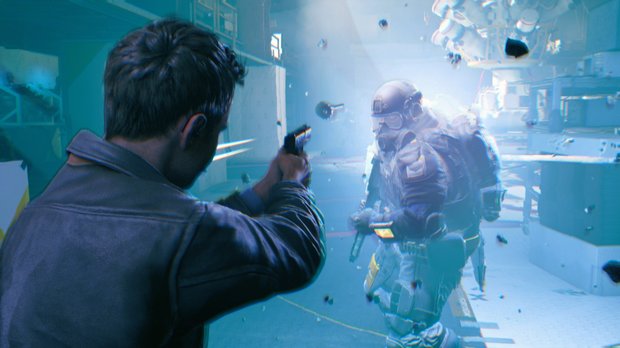
The story itself has a lot of potential. A layered, rather personal tale of two life-long friends - and one brother - locked in an ideological clash over how to deal with a temporal apocalypse brought about by research all three are involved with, it aspires to deal with issues of changing relationships, people growing apart, and objective realism versus optimistic heroism. When a time-travel experiment goes wrong, Jack and Paul take very different paths in trying to tackle the incoming End of Time, in a story that takes in a scope much greater than the day or so it technically plays out across. Because, of course, time travel. The problem comes with the way the story is told.
Perhaps it’s the symptom of a desire to not overload the player with cutscenes, knowing that there’s a full-blown TV show to watch as well, but the majority of the story’s richer lore is delivered via a seemingly endless supply of emails and diary extracts littered about the game world. These are often well-written – though largely missing Remedy’s typically knowing, genre-savvy wit – but the bulk of game time their discovery and perusal demands makes for a rather unbalanced mix. When the peak of your pivotal third act pauses for a 15-minute trawl through the computers of an empty office space, something has definitely gone wrong with your story’s delivery.
And it’s not even like you can afford to skip too many of them. While a lot simply go over old ground, or flesh out concepts you’re already familiar with, there’s some fundamentally important story material hidden among the reading. Indeed, one or two major twists and revelations are delivered only in easy-to-miss notes and diary pages, and the story would be a great deal weaker without them.
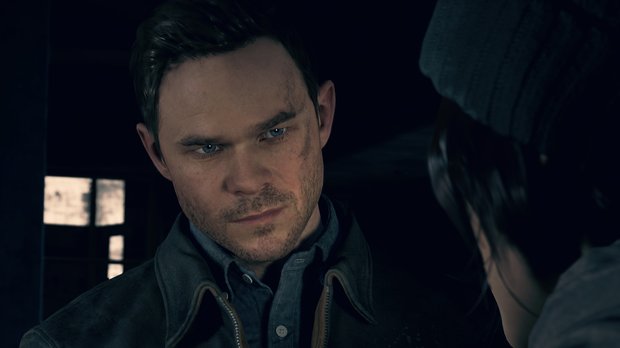
There’s a lot of genuinely enriching, supplementary material in Quantum Break’s story, but protagonist Jack’s experience of it skirts largely along on the surface unless you’re willing to break up the brief bursts of giddy combat with long periods of environmental investigation. If you don’t put in the time, the narrative only really hits ‘Holy shit’ levels of intrigue around the end of Act Four (of Five), which - much like the combat’s escalation - comes just too late. There are some nice, if light and very occasional, puzzles dotted about the place during some of this downtime, largely built around the idea of rewinding the individual timelines of objects in order to change the environment. But again, their infrequency stalls them from really growing into something significantly enjoyable.
As for that much vaunted TV show? It’s not awful, but neither is it worth the precedence it takes within Quantum Break’s overall format. Made up of 25-minute, live-action episodes that play out in between the game’s Acts, it tells the story of what the antagonistic Monarch corporation is up to in parallel to the in-game narrative. Fuelled by stock characters you’ve seen countless times in mid-tier TV – oddly good-looking tech nerds who bemoan their supposed social awkwardness with witty verbal flare, the goon with a heart of gold, who we know is good, because look, his wife is pregnant – it actually does a good job of fleshing out Quantum Break’s lore and characterisation, and is key to explaining motivations and twists that would otherwise seem entirely inexplicable.
Rarely though, is it truly impressive, hampered by a lack of vitality and some awful special effects that emphasise that what works for video game visuals does not necessarily translate to live footage. An interesting diversion, but one that ultimately raises the question of what the game could have achieved if the show’s running time had been freed up to further explore the interactive experience.
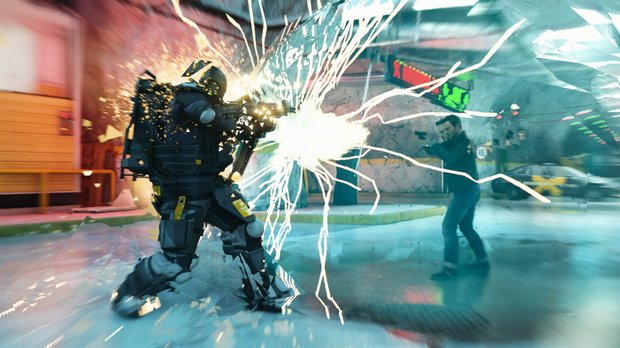
Certainly it might have tuned up some of the undesirable kinks. While Quantum Break largely looks gorgeous – its clean, glossy design and refracted time-effects make for an effervescent visual ride – it does stumble. I discovered one particularly unpleasant lighting bug along the way that delivered a long-term, full-screen strobe effect that rendered chunks of Act 3 rather taxing – and unsettling – to play until it went away. On the more physical side of things, Jack’s environmental navigation can frustrate as well, his ability to determine climbable surfaces inconsistent enough to force multiple failed attempts at exploration before he deigns that, yes, you were going the right way all along.
Of course, all of these things can be improved with patches – alongside the TV show’s catastrophic streaming problems pre-release; I’d strongly recommend you download the episodes from the Store before you start – but alas they won’t fix the things that hold Quantum Break back in the realm of ‘fun’ when it should have been great. It’s a frustrating situation. The elements of a fantastic and creative action game are all present and correct, and at times Quantum Break is indeed both of those things. But unfortunately its various disparate parts tend to get in each other’s way, leading to a needlessly complicated presentation that inhibits anything from shining as brightly as it should.
This game was reviewed on Xbox One.
More info
| Description | Remedy Entertainment creates a new IP for the next-generation Xbox One. |
| Platform | "Xbox One" |
| US censor rating | "Rating Pending" |
| UK censor rating | "" |
